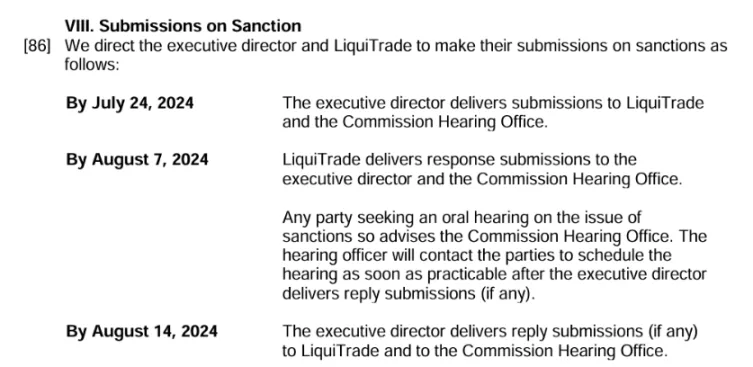Analyzing Canada’s Cryptocurrency Regulation and Compliance Challenges
As of March 2024, Canada has banned four cryptocurrency exchanges, including Catalyx, KuCoin, Poloniex, and xt.com. On the other hand, 15 cryptocurrency trading platforms have been approved to operate in the region.
Recently, the British Columbia Securities Commission (BCSC) investigated the Latoken platform operated by Liquitrade Ltd. and found that it was operating illegally in BC without registration. Users were not actually trading real crypto assets but were trading contract rights to these assets. This incident not only exposed violations in the market but also highlighted the importance of cryptocurrency regulation.
1. Event Review
Liquitrade Ltd. provided crypto asset trading services through the Latoken platform. However, the BCSC investigation revealed that users were not buying and selling crypto assets but were trading contract rights to these assets.
These contract rights were deemed derivatives, and since Liquitrade was not registered with the BCSC, its operations were declared illegal. The BCSC stated that Liquitrade did not cooperate as required during the investigation and could face sanctions, including fines and market bans.
As of March 2024, Canada has banned four cryptocurrency exchanges, including Catalyx, KuCoin, Poloniex, and xt.com. Conversely, 15 cryptocurrency trading platforms have been approved to operate in the region, including Bitbuy, Coinbase, and Fidelity.
The upcoming sanctions against Liquitrade may range from fines to service bans.

The timeline for sanctioning Liquitrade is set to be completed by August 14, according to court documents. While Canada is cracking down on unregistered cryptocurrency exchanges, licensed trading platforms continue to thrive.
2. Canada’s Cryptocurrency Regulatory Framework
Aiying provides a brief overview of Canada’s cryptocurrency regulatory policies—Canada’s crypto asset regulation is primarily handled by the Canadian Securities Administrators (CSA) and the Financial Transactions and Reports Analysis Centre of Canada (FINTRAC).
2.1 Major Regulatory Bodies
CSA (Canadian Securities Administrators)
- Responsibilities: The CSA is responsible for registering and regulating all entities that offer crypto asset trading, custody, advisory, or management services, ensuring compliance with Canadian securities laws. The CSA has issued several policy documents and guidelines to help businesses understand and comply with regulations. For instance, the 2021 regulatory framework mandates that crypto asset trading platforms must register with the CSA before operating.
- Licensing System: The CSA does not directly issue licenses but requires crypto asset trading platforms to register and comply with relevant regulations. Unregistered entities face severe penalties, including hefty fines and market bans.
FINTRAC (Financial Transactions and Reports Analysis Centre of Canada)
- Responsibilities: FINTRAC is tasked with anti-money laundering and counter-terrorist financing (AML/CFT) responsibilities, requiring businesses to implement stringent know-your-customer (KYC) procedures and regularly report suspicious transactions.
- AML/CFT Regulations: In 2019, FINTRAC updated the Proceeds of Crime (Money Laundering) and Terrorist Financing Act to further strengthen the regulation of crypto asset trading platforms, requiring them to register with FINTRAC and submit AML reports.
2.2 Key Regulations and Requirements
Registration and Licensing Requirements
All crypto asset service providers must register and comply with Canadian securities laws. The law stipulates that entities providing financial services without registration will face severe penalties, including hefty fines and market bans.
Anti-Money Laundering and Counter-Terrorist Financing (AML/CFT)
FINTRAC requires businesses to conduct KYC and report suspicious transactions. The 2019 update to the AML law mandates that crypto asset trading platforms must register with FINTRAC and regularly submit AML reports.
Investor Protection
The CSA protects investors through education and risk warnings, regularly publishing lists of high-risk platforms. The CSA’s website lists all unregistered high-risk crypto asset trading platforms to caution investors.
2.3 Compliance and Penalties
Compliance Requirements
Businesses must register with the CSA and FINTRAC before offering crypto asset services and comply with relevant AML/CFT regulations. They must establish robust compliance systems, including regular employee training, stringent KYC procedures, and maintaining communication with regulatory bodies.
Penalties for Non-Compliance
For unregistered businesses, the CSA and FINTRAC can impose severe penalties, including fines, market bans, and criminal liability. For example, Liquitrade Ltd. was investigated by the BCSC for operating the Latoken platform without registration and may face sanctions, including hefty fines and market bans.
Conclusion
Canada has established a relatively comprehensive framework for cryptocurrency regulation, primarily supported by the Canadian securities laws and AML laws, with CSA and FINTRAC responsible for oversight. While the current policies have significantly succeeded in protecting investors and maintaining market transparency, continuous updates and improvements are necessary to address emerging risks and market changes.